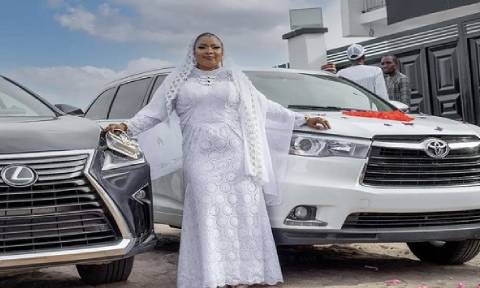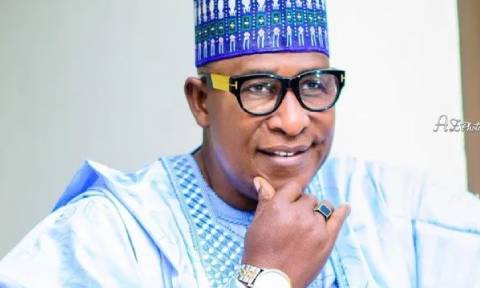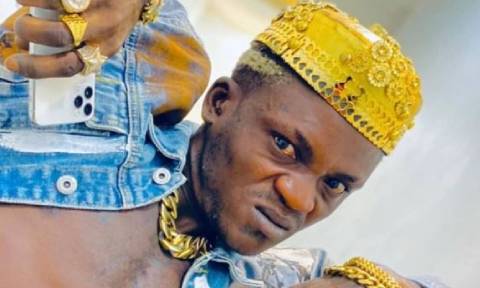
From your skincare outfit, Ageless, to your fashion house, House of j’Ola, why the movement?
Well, I am basically somebody who constantly revamps things. I like to rediscover myself. I am somebody who when I see that there is a little bit of distortion or whatever in any field, I get into it. I have always been in the clothing business. I opened my first shop in America, about twenty years ago, where I used to take African clothes, mixed with all kinds of fabrics to sell. So, it is not something that I just started; it is something that I have always been in, and decided to come back to. We make haute couture dresses that you can wear anywhere in the world, on the streets of Paris for less than twenty thousand naira, with my fabrics. Why I have decided to do this is to make sure that I change the rules of engagement.
When you say change the rules, what are these rules?
I want to cater for the masses. I want a situation whereby anybody can afford to wear something, very good not just thrash, or not just “okrika” for that matter. I want people to be able to go out and other people get to say to them, “ I like what you are wearing”. Basically, it is just a situation where we have to make sure that people can afford clothing. And another thing, too, is that I am not just catering for the Nigerian market. The African Growth Organisation Agitation, AGOA, has been in existence for twelve years now and it says that Africans can bring in goods to America where you can sell, and there is no tax. What is expected of people in the group is for them to repatriate the money, not you making money and leaving it in the bank in America. They want a situation whereby this money comes back to Africa.
It should be used to pay salaries, to revamp your company, to hire more workers, that is what AGOA is all about. So, I decided to make high street clothes for the American market because I can make them. If you go to America for example and you pay $500 for a dress, that dress would be waoh. But people are spending 300,000, 250,000, 200,000 naira in Nigeria. That is about $2000 on clothes. I will not even buy Dolce and Gabanna for $2000, or a French haute couture for that amount. That is just me.
We are doing something for the Nigerian market. If you see anything that Dolce and Gabanna has done, or anything that any fashion house anywhere in the world has done, and you are so desperate to wear it, come to me. Bring the design, and we will make it for a fraction of that. So, if that dress was originally for $2000, we will do it for $200. There is a company in America that after the Oscars, copies all the clothes worn by celebrities to the awards, which they sell for $100. That is what I am bringing into the market. I have got my own designs. Another thing that I have done is I have pulled together a group of young talented people who cannot afford to set up. So I asked myself, what I could do for them. So I decided to have them make their own designs. So you will see my designs and also see their own designs where they will be given credit. Like you see so and so for Coco Chanel. You will also see the same here; so and so designer for house of j’Ola. This will be an opportunity for young people who have learnt designing from Yaba Tech or wherever else, and they want to be part of the designing world.
This must be a capital intensive venture. How expensive is it and what are some of the challenges you face?
It is capital intensive. We have spent a lot of money acquiring machines. We also have the best tailors, believe me. Nigerians are a bunch of talented people. As a matter of fact, from the beginning to the end of making the clothes, I am involved. My biggest challenge is electricity. I spend well over 300,000 a month ensuring that there is a constant supply of electricity.
What is your source of inspiration?
I am someone who sleeps from 9pm to 3am every day. And when I wake up at 3am, I say my prayers, wash my face and teeth and I am on the computer. I am on the Internet to find out what is happening in the beauty industry, the fashion industry. And after searching, I sit down and think. I am constantly thinking. For me, failure is not in my dictionary. When I fail, I keep trying. I believe in re-inventing, re-assessing, rejuvenating.
Right now, I am capitalizing on the youths. The clothes are going to be geared towards a lot of the youths; the jeans thing, Ankara mixed with jeans. I have clothes for as low as N5000, which the young ones can afford. And mind you, these clothes are not cheap looking. Rather, they are creatively done to suit the taste of the young ones.
As a fashion expert, do you think that the look of a typical Nigerian woman is slim or big? Many fashion designers choose to portray the Nigerian woman as broom-like slim.
I do not think any woman is supposed to be skinny. There is one thing about life; you are skinny when you are young. Unless you are genetically rearranged, the bottom line is that there is nobody that I know that is slim, and did not gain some sort of weight. I was very skinny in those days. Another thing that I have noticed is that when you are too skinny and you are older, you do not really look good. You have a lot of lines on the face, and the face tends to look older than the body. So, what you end up having is a nice young body with a head that looks a lot older than yourself. But I believe that you do not have to be overweight too. As long as you are comfortable in your body, good. At my age, I am over fifty years old, I can walk ten miles. I have enormous energy. It is all about being comfortable in your skin; not necessarily fat or slim, because you can be skinny and not healthy. My grandmother died at 105 and she was on the big side, never hypertensive. I always tell people that you don’t have to be very skinny but you also don’t have to be overweight. As you grow older, you need to put on a little bit of flesh, not necessarily be fat. Bring out a fifty year old women that is skinny, and a sixty year old woman that is plump, the latter looks a lot younger than the former.
Why do you think the fifty year old woman looks older?
Simple. Many of these older women are starving themselves in the bid to stay slim. There is what you call draining. If you do not put water and nutrients back into your skin, it is going to dehydrate.
From your experiences abroad, how would you score the indigenous fashion industry?
I think that they have done well. For me, it has been a long time since I stopped wearing English clothes. I just believe that we have the fabrics here. Coincidentally, if you wear our fabrics abroad, they are always commended. And recently, on the catwalk, I saw Jean Paul Guitier with Nigerian fabrics. They will take it soon. That is the problem we face in the world. Africans start something; Europeans take it and run away. But we are going to go into New York that is the idea. So basically, what I will be looking at doing is take or fabrics mix them with theirs and make things they can wear to parties. We need to look upwards so that we can get foreign exchange back into this country.
Did your growing up years prepare you, in anyway, for the things you do today?
My dad was the greatest man of all. If everybody could have a dad like mine, then I think the world would be a better place. The man lived and died for his children. It is so unfortunate that when we were ready to take care of him, he checked out. When I go to the village, I go the graveside and try to tell him some of the things that I have done or plan to do. I know it might sound morbid, but I do it. I believe my father was the biggest influence on my life. My mother was such a tough cookie. I have seen her work so hard. We lived a life of luxury before the war. During the war, I started carrying water on my head. Imagine coming from an affluent background and all of a sudden, the war came and all hell was let loose. We had to go the village where I started carrying water and firewood on my head. Looking back, I think that was the best time of my life. My retired grandfather had this massive rubber plantation where I learnt how to tap rubber. I had so much fun doing it. I learnt so much from the village. I went fish farming; I know how to catch crayfish. I know how to make garri; from the planting of cassava, to harvesting, cutting, fermenting and then frying. I know how to get the kpo-kpo garri out of it. So, if it wasn’t the war, I would probably be a Miss Goody- Two- Shoe kind of person. I am glad I have the experience. The experience taught me that nothing comes easy in life, and nobody knows tomorrow.
How would you describe the fashion sense of the Nigerian woman?
I think we tend to overdress. There is so much going on; the jewelry, the accessories. What I am bringing to the table is my style, the things I like to wear. I am not an haute couture person. I love to go out in jeans, a t-shirt, lovely bag and shoes, nice sunglasses and I am comfortable with those.
Who are your definitions of well dressed women?
Ireti Kingibe; she dresses simple but really beautifully. Bisi Abiola is stunning. These are my kind of people.
What are your passions?
Sunglasses. I do not spend money on clothes that is why I am doing what I do now.
What is the secret of your good looks?
I am basically a happy person. Nothing gets to me. Anything that has happened has happened, you cannot change it. You can only try to do something so that it does not happen again. Why sit down and worry about something that you cannot change right there and then? But what makes me happiest is when somebody is in dire need and I can help, because people have shown me kindness and so, I must reciprocate. I am happy for everything I have in life. I am not an ostentatious person.
How do you relax?
I watch lot of discovery channel, news channel. What I want to know is what happened in 1979, and then you try to equate it with what is happening now.
How would you describe your person?
A girl put on this earth to make her mark, be nice. I am probably one of the most loyal people on this earth, to friendship, family, and friends, anything that I get to do in my life. I do not backbite. What I do not like I say, and it ends there.
How have twenty-seven years of marriage been and what are the secrets to a happy marriage?
I married my best friend. We have our quarrels but if I have to do it again, I will marry the same man.
Where did you meet him?
At the airport. He is a wonderful man. He has shown me so much love over these years. He has not changed. I think that I am probably one of the lucky few. When I wake up in the morning, I first of all pray for my husband, then my son.
How many children do you have?
One son; we had a daughter but she died. I am happier than most people that have ten children.



















